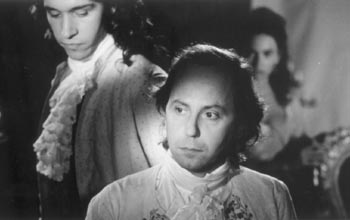Figaro It Out
'Beaumarchais' sweetens a scoundrel
By Richard von Busack
THIS WEEK'S FILM HITS include a fantasy about a misunderstood tsar of Russia and his lovely family murdered by a scheming zombie. As a counterbalance to this reactionary treat, it's pleasant to see a film that's in favor of the French Revolution. Director Edouard Molinaro's Beaumarchais is a costume comedy/drama based on an unpublished play by Sacha Guitry. It follows 10 years in the career of Pierre-Augustin Caron de Beaumarchais (1732-1799), the playwright, businessman and intriguer best known as the author of the plays that were the sources for Mozart's The Marriage of Figaro and Rossini's The Barber of Seville. These works, which satirized aristocratic pretension, have a daring we can't understand today. Napoleon said famously that The Marriage of Figaro was "the revolution already in action."
Beaumarchais was born a watchmaker's son and ended up a titled nobleman, thanks to sound investments and a strategic marriage. He was the confidant of kings and a friend to some of the most important men of the time. He was not just a spy, a lover and a gunrunner, as depicted here, but also a slaver. Beaumarchais invested in the slave trade after previously having written a poem denouncing it. Thus commerce doth make cowards of us all. Despite this rich--no, wealthy--material, despite also the handsome appointments, expensive costumes and sweet-faced starlets, Beaumarchais the Scoundrel is a disappointment, a marsh of epigrams sweetened until the teeth ache. The characterizations seem slight and silly. The Prince di Conti, the George Smiley of his era, is played by a coasting Michel Piccoli, beaming like Burt Lancaster. Jeff Nuttall's low-comedy Benjamin Franklin is rivaled for bad taste by an in-heat Chevalier d'Eon (played by the gorgeous Claire Nebout; the real Chevalier was a great spy and a great transvestite, but hardly a looker).
Apparently not counting on the undeniable Gallic charisma of Fabrice Luchini in the title role, the movie softens the great man's complicated life, making him a nice guy's nice guy. His success seems the product of negligent luck; providence had nothing to do with it. The audiences for his early plays were primed with claquers, or professional applauders (the profession hasn't died out, as one notes when studying the careers of Joel Siegel and Gene Shalit). The Goezman affair, which opens the movie, is presented as Beaumarchais' triumph, although it was the end result of the adventurer's attempt to (a) bribe a judge and (b) try to retrieve the money after the judge refused to be bought. Beaumarchais the Scoundrel tells of that misadventure in a murmur, so that it is almost impossible to understand Beaumarchais' legal trouble. The confusion in these early sequences reigns over the rest of the film. Possibly you can zone out over the costumes and the handsome actors, but trying to follow the sprawling plot, potholed with careful omissions, is a nearly hopeless task.
[ Metro | Metroactive Central | Archives ]

Scoundrel Time: Manuel Blanc keeps a wary eye on Fabrice Luchini in 'Beaumarchais.'
Beaumarchais the Scroundrel (Unrated; 100 min.), directed by Edouard Molinaro, written by Jean-Claude Brisville and Molinaro, based on a play by Sacha Guitry, photographed by Michael Epp and starring Fabrice Luchini and Michel Piccoli.
From the Nov. 26-Dec. 3, 1997 issue of Metro.
![[Metroactive Movies]](/movies/gifs/movies468.gif)